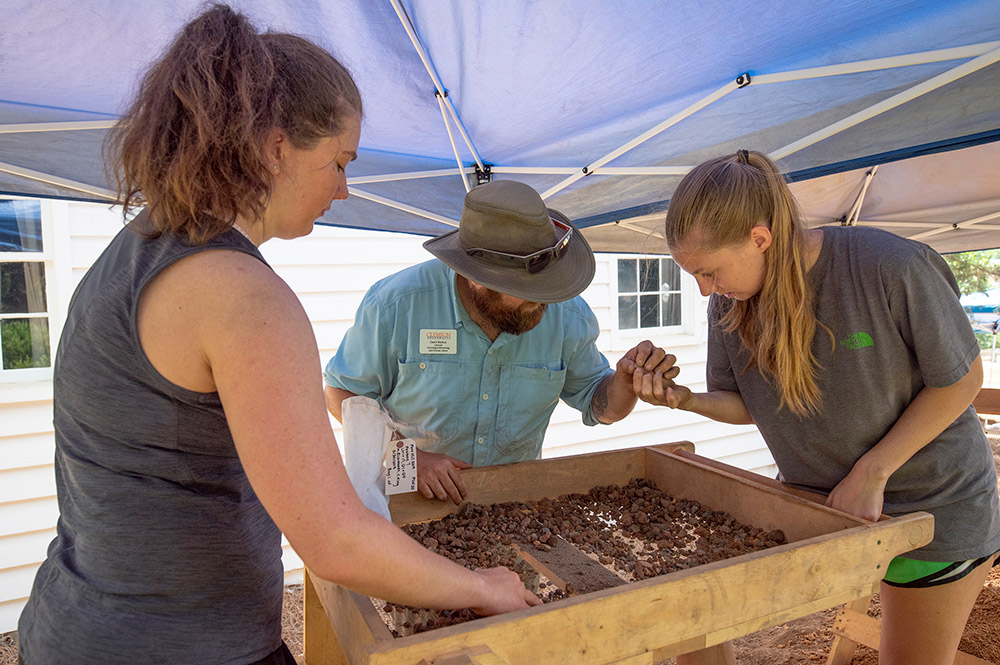Engagement Opportunities
Study Abroad

Human Skeletal Analysis in Hungary: Dr. Katherine Weisensee leads students on a three-week trip to the University of Szeged in Hungary to examine a collection of skeletal remains recovered from archaeological excavations dating from the Neolithic to the 1800’s. Students collect and analyze data to examine demographic and health trends within a selected sample of skeletal remains.
General Education in Rome: Students can complete general education requirements with Clemson faculty at the American University of Rome. Introduction to Anthropology is occasionally offered through this program. Students in this course make primate observations at the Rome Zoo, study the impact of social stratification in the Jewish Ghetto, and examine religious rituals at a Roman Catholic mass at the Vatican.
For more information about study abroad opportunities, please check out Clemson’s Study Abroad page.
Examples of Creative Inquiry Projects

Visit Creative Inquiry and Undergraduate Research to learn more about student research opportunities in the Department of Sociology, Anthropology and Criminal Justice.
Student Organizations

Anthropology Club: The anthropology club is a lively organization that provides students with social and professional networking activities, as well as opportunities for fields trips and service learning projects. Past activities have included archaeological digs, a trip to a zoo to study primate behavior, and the surveying and mapping of a local slave cemetery. For more information on the anthropology club, please contact Dr. Katherine Weisensee.
Criminal Justice Club: Our department houses a very active criminal justice club that sponsors professional development and networking events throughout the year, as well as an annual law enforcement and legal career fair that attracts dozens of federal, state, and local agencies and graduate schools from across the country. For more information on the criminal justice club, please contact Dr. Marjie Britz.
Sociology Club: The sociology club offers students with an interest in the field the chance to develop friendships and professional connections at a variety of scheduled events throughout the academic year. For more information on the sociology club, please contact Dr. Candace Coffman.
Lambda Alpha: Established in 1968, the purpose of Lambda Alpha National Anthropology Honor Society is to both acknowledge and reward academic excellence of students in the field of Anthropology. The name Lambda Alpha is composed of the initial letters of the Greek words Logos Anthropos (Λογος Ανθροποσ), meaning “the study of humankind.” Qualified students, with either a major or minor in Anthropology, derive benefits from their lifetime membership including the ability to submit to Lambda Alpha’s peer-review journal publication and the chance to compete in student paper and graduate scholarship competitions. For more information on Lambda Alpha, please contact Dr. David Markus.
Alpha Kappa Delta: AKD is the International Sociology Honor Society, dedicated to the ideal of Athropon Katamannthanein Diakonesin or "to investigate humanity for the purpose of service." Qualified undergraduate students in our department derive a variety of benefits from membership, including access to publications in the field and the chance to compete in student paper competitions. For more information on AKD, please contact Dr. Sarah Winslow.
Internships

Students in both our sociology and criminal justice programs have the opportunity to complete internships for course credit through our Field Experience (SOC 4950) and Justice Leadership Practicum (JUST 4920) courses, respectively. Both courses require students to complete a 112-hour, semester-long field experience and to take part in a weekly professional development seminar. Students may apply to internships with hundreds of local and national agencies and organizations. Some examples of our students’ past field placement sites include:
- Federal, state, and local law enforcement agencies, such as the FBI, the U.S. Marshals, the Secret Service, the Department of Juvenile Justice, and the Anderson and Greenville County Sheriff’s Offices
- Human services agencies, such as the Department of Social Services, the Family Counseling Center of Anderson, Foothills Alliance Sexual Trauma and Child Advocacy Center, and Safe Harbor Domestic Violence Shelter
- Local and national nonprofit organizations, including the Make-a-Wish Foundation, the United Way, and Clemson Community Care
- Health and medical organizations, such as St. Francis Hospital, Oconee Memorial Hospital Hospice of the Foothills, and Sterling House Assisted Living
- Educational settings, including Clemson’s Michelin Career Center, the School District of Pickens County, and Anderson County’s Communities in Schools Program
An internship offers an amazing opportunity to apply social science concepts in a real-world setting, while developing professional skills and making valuable connections for future careers.
